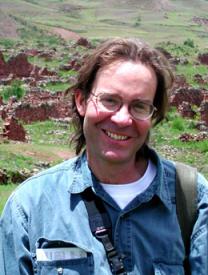Clark Erickson is interested in how archaeology can provide a long-term perspective on environmental change, biodiversity, and sustainable management. Since 1974, Erickson's Andean and Amazonian research focuses on the contribution of archaeology to understanding the complex human history of the environment and cultural activities that have shaped the Earth. Erickson uses historical ecology, landscape archaeology, and applied archaeology to understand the long-term complex human history of the environment and cultural activities that have shaped the Earth. His contributions include the human role in contemporary biodiversity, indigenous knowledge systems, native agriculture, sustainable landuse, and cultural landscape structure and aesthetics. He has considerable experience collaborating with descendant communities on applied archaeology projects with potential for sustainable development (Quechua in Peru, Cofán in Ecuador, and Arawak in Bolivia). Most recently, Erickson investigated pre-Columbian cultural landscape in the wetlands, forests, and savannas of the Amazon region of Bolivia (raised fields, ring ditches, fish weirs, causeways, and canals). He is editor of two recent volumes Time and Complexity in Historical Ecology: Studies in the Neotropical Lowlands (2006) and Landscapes of Movement: Trails, Paths, and Roads in Anthropological Perspective (2009) in addition to numerous other scientific and popular publications. Erickson is currently Associate Professor in Anthropology at U. Penn and Associate Curator of the American Section of the Penn Museum. His research has been funded by the National Science Foundation, H. John Heinz Charitable Trust, the University Research Foundation, American Philosophical Society, and the Interamerican Foundation.
Clark L. Erickson

Professor of Anthropology at Penn Curator-in-Charge of the American Section at the Penn Museum
cerickso@sas.upenn.edu(215) 898-2282
Office 436, University Museum
Website